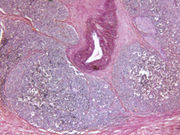PCA3 and T2ERG add utility for predicting prostate cancer when combined with PCPT risk calculator
MONDAY, June 19, 2017 (HealthDay News) — Novel biomarkers have been identified that may have utility for predicting prostate cancer in non-African-American men, according to a study published in the July issue of The Journal of Urology.
Padraic G. O’Malley, M.D., from the Weill Cornell Medical College in New York City, and colleagues examined the utility of urinary biomarkers added to clinical risk calculators for predicting prostate cancer in a cohort of 718 men who were part of the Early Detection Research Network (72 African-American men).
The researchers found that when combined with the Prostate Cancer Prevention Trial Risk Calculator, prostate cancer antigen 3 (PCA3) and transmembrane protease serine 2 and v-ets erythroblastosis virus E26 oncogene homolog gene fusion (T2ERG) added utility for the prediction of prostate cancer and clinically-significant prostate cancer. This utility was only seen in non-African-American men, with significant increases in the area under the curve values for prostate cancer and clinically-significant prostate cancer for PCA3 (0.64 to 0.75 and 0.69 to 0.77, respectively) and T2ERG (0.64 to 0.74 and 0.69 to 0.73, respectively). No added benefit was seen with the addition of biomarkers for African-American men.
“As novel biomarkers are discovered, clinical utility should be established across demographically diverse cohorts,” the authors write.
Two authors disclosed financial ties to the biopharmaceutical industry.
Copyright © 2017 HealthDay. All rights reserved.








